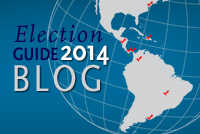2014 Election Blog: Corruption Accusations Mark Last Leg of Colombia's Presidential Race
The gap between the president and his main contender narrows as both sides face corruption allegations ahead of the May 25 vote.
Colombia’s presidential race grew tense in recent days as corruption allegations arose among the ranks of two of the top contenders. President Juan Manuel Santos remains the frontrunner, though his rival—the Democratic Center’s Oscar Iván Zuluaga, supported by former President Álvaro Uribe—is gaining ground. The vote takes place May 25.
On May 6, Santos’ campaign strategist Juan José Rendón resigned after Semana published a story alleging he received $12 million from a drug trafficker to help negotiate his surrender. Rendón said he had been approached by traffickers but denied taking money. On May 8, Zuluaga's campaign chief Luis Alfonso Hoyos also quit his post. He was connected to a hacking scandal intended to disrupt peace talks with the Revolutionary Armed Forces of Colombia (FARC). The same day, former President Álvaro Uribe accused Santos of using $2 million in funds received by Rendón for his 2010 election campaign. But on May 13, Uribe refused to testify or provide evidence to the attorney general, who requested the former president return on May 14 to testify.
These revelations had an impact on the polls. For the first time, one survey found Zuluaga pulling ahead. A May 12 National Consulting Center poll for CM& News found that in the first round, Zuluaga would come in first with 24 percent of the vote, followed by Santos with 22 percent. In a runoff, Zuluaga would win with 42 percent with Santos at 34 percent. Other polls put Santos in first place, but show the Democratic Center candidate gaining momentum. A May 6 Cifras y Conceptos poll places Zuluaga in second after rising 8 points since March. An April 30 Gallup poll showed him up about 5 points over the previous month.
The tumultuous last weeks of the campaigns could have an impact on voter turnout and blank votes. The April 30 poll found that only 54 percent intend to vote, while nearly 16 percent plan to cast a blank vote. The May 12 poll showed 14 percent of voters wouldn’t choose any of the candidates on the ballot, while 9 percent say they will cast a blank vote. Margin of error on these surveys falls between 2 and 3 percent; in the 2010 election, Santos defied polls by winning the most votes in the first round.
Peace talks with the country’s guerilla groups also represent a division between the two candidates and their supporters. Around 64 percent of Colombians support the peace process, a May Gallup survey indicates. Santos launched the talks in August 2012, and said this month that he believes a peace accord will be signed by the end of year. But Zuluaga opposes the dialogue. Earlier this month, Zuluaga said the talks were “the surrender of democracy” and said he would suspend the peace process if elected.






